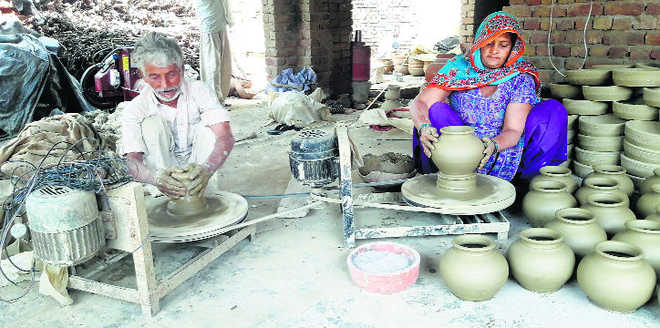Jhajjar’s dying occupation of pottery
Ravinder Saini
Earthen pitchers and other utensils such as ‘surahi’, water bottles and containers are still in high demand even in the era of refrigerators but the number of potters is continuously reducing due to a scarcity of quality soil and other materials used in making utensils, rising prices and a ‘lethargic’ attitude of the state government towards promoting the traditional occupation.
There were 150 potter families in Jhajjar city over two decades ago but only six of them are at present engaged in the business even as earthen utensils made by them are supplied to Rajasthan, Gujarat and Maharashtra during the summer.
“Refrigerators are used in most of the houses for cold water but the demand of earthen pitchers is still as high as it was over a decade ago. However, people engaged in utensil making have adopted other occupations for various reasons. First, potters earn less money even though they work hard right from mixing soil to preparing utensils. Second, getting quality soil and other materials at reasonable rates has become difficult,” says Ved Prakash, a resident of Chhawani Colony, who is making earthen utensils for the past 20 years.
He says that they receive orders for pitchers, ‘surahi’, containers and water bottles from Rajasthan, Maharashtra and Gujarat every year but they can fulfil limited orders due to an acute shortage of potters. All six families have to work together to meet the demand as the younger generation has no interest in carrying forward the occupation of their ancestors, he adds.
“We, too, don’t want our children to face hardships that we have been facing. The number of potters has gone down drastically in the past one decade. Even our children now ask us to leave the occupation considering hard work required in preparing earthen utensils,” says Prakash. The state government should do something to keep this traditional occupation alive, he adds.
Rajbir, another potter, says machines are available in the market for mixing, filtering and crushing soil to make it usable for preparing utensils but poor potters cannot afford them. The machines have made easy the process of making earthen utensils to a good extent.
He says that water campers are in demand, especially in urban areas, but earthen pitchers, containers and bottles still hold their charm as their sweet and fragrant water quenches thirst. Even people believe that the cold water of a pitcher is better for health rather than of a refrigerator and soft drinks. So, they have again started using pitchers.
“As earthen utensil making is no more a profitable business due to the rising prices of soil and low returns, the younger generation of potters is not keen to continue with the traditional family source of livelihood. We usually supply utensils to Jaipur, Chandigarh, Jhunjhunu, Sikar, Nasik, Surat and Ahmedabad in March and April but this year, uncertain weather conditions have adversely affected our business. We could not make utensils due to rain and cold conditions in March,” adds Rajbir.
Suresh, yet another potter, says that the state government should come forward to keep this traditional art and occupation alive by providing loans at nominal interest rates and subsidy for buying machines to potters, who are struggling to earn their livelihood.
Mitti Kala Board to promote traditional art
The state government had constituted the Mitti Kala Board in 2010 to promote the traditional art of hand-crafted earthenware, pottery and artifacts.
The board aims to encourage and promote artisans involved in the manufacturing of earthenware, pottery and artifacts, besides carrying out awareness campaigns for earthen products and putting in place a marketing network of sales outlets.
The state government should come forward to keep this traditional art and occupation alive by providing loans at nominal interest rates and subsidy for buying machines to potters, who are struggling to earn their livelihood. — Suresh, a potter
Refrigerators are used in most of the houses for cold water but the demand of earthen pitchers is still as high as it was over a decade ago. However, people engaged in utensil making have adopted other occupations for various reasons. First, potters earn less money even though they work hard right from mixing soil to preparing utensils. Second, getting quality soil and other materials at reasonable rates has become difficult. — Ved Prakash, resident of chhawani colony
As earthen utensil making is no more a profitable business due to the rising prices of soil and low returns, the younger generation of potters is not keen to continue with the traditional family source of livelihood. We usually supply utensils to Jaipur, Chandigarh, Jhunjhunu, Sikar, Nasik, Surat and Ahmedabad in March and April but this year, uncertain weather conditions have adversely affected our business. We could not make utensils due to rain and cold conditions in March. — Rajbir, a potter









